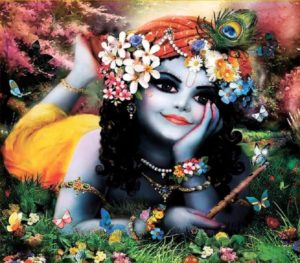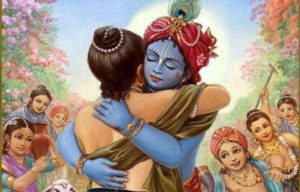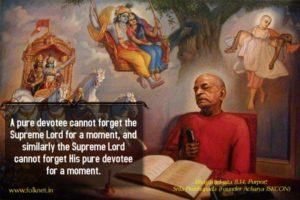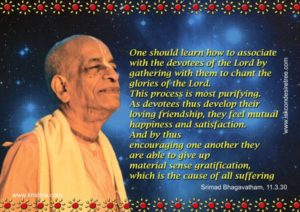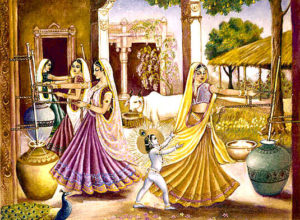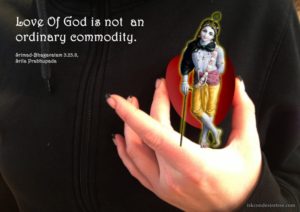Bhagavad Gita and Srimad Bhagavatam are two most important scriptures for Kali Yuga, they have specifically manifested for us kali yugians. If we sincerely try to serve these two transcendental scriptures then we can unlock many hidden gems. Let us take a look at the famous verse from Bhagavad gita
जन्म कर्म च मे दिव्यमेवं यो वेत्ति तत्त्वतः ।
त्यक्त्वा देहं पुनर्जन्म नैति मामेति सोऽर्जुन ॥
One who knows the transcendental nature of My appearance and activities does not, upon leaving the body, take his birth again in this material world, but attains My eternal abode, O Arjuna.
(Bg 4.9)
As we read the above verse it looks very simplistic, as if Krishna speaking these words just to encourage everyone to accept His shelter by holding a big carrot in front of us. Rather, coming out from the lotus like mouth of Sri Krishna, every single verse of Bhagavad Gita is Absolute and so is its conclusion and promise. Srila Prabhupada further declares in his purport –
He who accepts this truth on the strength of the authority of the Vedas and of the Supreme Personality of Godhead and who does not waste time in philosophical speculations attains the highest perfectional stage of liberation. Simply by accepting this truth on faith, one can, without a doubt, attain liberation.
(Bg 4.9p)
The above statements may baffle us, especially devotees. We already know that Krishna is the Supreme personality of Godhead, we know about Krishna’s transcendental appearance and activities but liberation seems a bit far. But then how much do we even really know Vrajendra Nandan Krishna, Krishna of Vrindavan.
Both the verse and its purport are ‘packed’ and we can unpack them in multiple ways. Today, however let us unpack it from the angle of Krishna’s birth, how and where exactly did Vrajendra Nandan Krishna appeared.
Scriptures say that Svayam Bhagavan Sri Vrajendra Nandan Krishna does not take even one step out of Vrindavan. Many of us may have read the pastime in Srimad Bhagavatam when Akrura came to invite Krishna and Balaram to Mathura, the two brothers he finally took with him to Mathura were different personalities than what he assumed accompanied him.
Vrajendra Nandan Krishna
Nanda Maharaj returned to Vrindavan without Krishna and Balaram. He was accompanied only by the cowherd boys and men. It was certainly a very pathetic scene for the gopis, Mother Yashoda, Srimati Radharani and all the other residents of Vrindavan. Many devotees have tried to make adjustments to Krishna’s being away from Vrindavan because, according to expert opinion, Krishna, the original Supreme Personality of Godhead, never goes even a step out of Vrindavan. He always remains there. The explanation of expert devotees is that Krishna was actually not absent from Vrindavan; He came back with Nanda Maharaj as promised.
When Krishna was starting for Mathura on the chariot driven by Akrura and the gopis were blocking the way, Krishna assured them that He was coming back just after finishing His business in Mathura. He told them not to be overwhelmed and in this way pacified them. But when He failed to come back with Nanda Maharaj, it appeared that He either cheated them or could not keep His promise.
Expert devotees, however, have decided that Krishnawas neither a cheater nor a breaker of promises. Krishna, in His original identity, returned with Nanda Maharaj and stayed with the gopis and Mother Yashoda in His bhäva expansion. Krishna and Balaram remained in Mathura not in Their original forms but in Their expansions as Vasudeva and Sakarshana. The real Krishna and Balaram were in Vrindavan in Their bhäva manifestation, whereas in Mathura They appeared in the prabhava and vaibhava expansions. This is the expert opinion of advanced devotees of Krishna. Externally, however, They were absent from Vrindavan.
(Krishna Book, chapter 46)
If Vrajendra Nandan Krishna never takes steps out of Vrindavan then how did He take birth in Mathura?
Let us try solve this mystery by seeing it from the eyes of our acharya and the scriptures.
Thereafter, exactly when Vasudeva, being inspired by the Supreme Personality of Godhead, was about to take the newborn child from the delivery room, Yoga-māyā, the Lord’s spiritual energy, took birth as the daughter of the wife of Mahārāja Nanda.
Srila Vishvanath Chakravarty Thakura discusses that Krishna appeared simultaneously as the son of Devaki and as the son of Yashoda, along with the spiritual energy Yoga-māyā. As the son of Devaki, He first appeared as Vishnu, and because Vasudeva was not in the position of pure affection for Krishna, Vasudeva worshiped his son as Lord Vishnu. Yashoda, however, pleased her son Krishna without understanding His Godhood. This is the difference between Krishna as the son of Yashoda and as the son of Devaki. This is explained by Vishvanath Chakravarty on the authority of Hari-vaṁśa.
(SB 10.3.47+p)
What Srila Prabhupada is disclosing above is simply astonishing! Prabhupada is divulging to us that Krishna appeared simultaneously in two places- as the son of Devaki and as son of mother Yashoda, in Vrindavan.
Let us read the commentary of Srila Vishvanath Chakravarty Thakura from which Srila Prabhupada quoted the above.
In the Hari Vamsa is says that that in the eighth of her pregnancy Devaki and Yashoda gave birth at the same time to their Children. But here in Bhagavatam it is stated that that Yashoda gave birth after Devaki. How to correlate the two contradictory statements? Exactly when Devaki gave birth to Krishna, Yashoda also gave birth to Krishna. After that, as described in this verse, Yashoda birth to Yagamaya. Yashoda gave birth to two children at different times. This is confirmed in SB 10.4.9, for when Yogamaya falls from the hands of Kamsa, she is called younger sister of Krishna. But when Krishna was born to Yashoda it is not stated that he had four hands. It is understood that He was born from Yashoda with two hands.
(Srila Vishvanath Chakravarti Thakura purport to SB 10.3.47)
Srila Vishvanath Chakravarty Thakura is revealing to us that mother Yashoda gave birth to two kids. A son, Krishna, was born at the very same time when Lord Vishnu appeared as the son of Devaki. (Hence Krishna’s birth is rightly celebrated as Janamashtami everywhere and not on Nandotsava as some devotees tend to suggest.) Second child, as we know, was Yogamaya, Krishna’s ‘younger’ sister.
How the umbilical cord could still be intact if kids were exchanged in the night?
Srimad Bhagavatam itself gives us a hint about this secret while describing how Nanda Maharaj celebrated Krishna’s ‘Jata-Karma’ ceremony, cutting of the umbilical cord connecting the child and placenta.
nandas tv ātmaja utpanne jātāhlādo mahā-manāḥ
āhūya viprān veda-jñān snātaḥ śucir alaṅkṛtaḥ
vācayitvā svastyayanaṁ jāta-karmātmajasya vai
kārayām āsa vidhivat pitṛ-devārcanaṁ tathā
Sukhdeva Gosvami said: Nanda Maharaj was naturally very magnanimous, and when Lord Sri Krishna appeared as his son, he was overwhelmed by jubilation. Therefore, after bathing and purifying himself and dressing himself properly, he invited brahmanas who knew how to recite Vedic mantras. After having these qualified brahmanas recite auspicious Vedic hymns, he arranged to have the Vedic birth ceremony celebrated for his newborn child according to the rules and regulations, and he also arranged for worship of the demigods and forefathers.
(SB 10.5.1-2)
Srila Prabhupada writes in the purport of the above verse :
The jāta-karma ceremony can take place when the umbilical cord, connecting the child and the placenta, is cut. However, since Krishna was brought by Vasudeva to the house of Nanda Maharaj, where was the chance for this to happen? In this regard, Vishvanath Chakravarty Thakura desires to prove with evidence from many shastra that Krishna actually took birth as the son of Yashoda before the birth of Yoga-maya, who is therefore described as the Lord’s younger sister.
(SB 10.5.1-2p)
Srila Rupa Gosvami also reveals this secret!
preshthanandair vraje tais tair atmano ‘pi vimohanaih
lilollasair vilasati shri-lila-purushottamah
Because He enjoys many happy pastimes, delighting His dear associates, and even enchanting Himself, Lord Krishna is called “lila-purushottama” (the most playful person).
asamordhvena bhagavan vatsalyena vrajesayoh
sutatvenaiva sa tayor atmanam vetti sarvada
Because the parental love of Vraja’s king and queen has no equal or superior, Lord Krishna eternally thinks Himself their son.
kecid bhagavatah prahur evam atra puratanah
vyuhah pradurbhaved adyo griheshv anakadundubheh
goshthe tu mayaya sardham shri-lila-purushottamah
In ancient times some devotees have said that the Lord appeared in His Vasudeva feature in the home of Maharaja Vasudeva, and at the same time He appeared, along with Yogamaya, in His original form as Sri Krishna in the village of Vraja.
gatva yadu-varo goshtham tatra suti-griham visan
kanyam eva param vikshya tam adayavrajat puram
pravisad vasudevas tu shri-lila-purushottamam
When Maharaja Vasudeva arrived in Vraja, he entered the maternity room, saw (Yashoda’s, daughter and, taking her with him, returned to Mathura. The Vasudeva expansion (Maharaja Vasudeva carried with him, then merged in the body of Sri Krishna.
etac cati-rahasyatvan noktam tatra katha-krame
kintu kvacit prasangena sucyate shri-sukadibhih
Because this pastime is very confidential, it was not related in the Srimad-Bhagavatam. Nevertheless, Sukadeva Gosvami and other great devotees have indirectly described it in some of their writings.
Srila Rupa Gosvami then quotes below four verses from Srimad Bhagavatam which specifically describe Krishna as son of Nanda Maharaj.
“Nanda Maharaj was naturally very magnanimous, and when Lord Sri Krishna appeared as his son, he was overwhelmed by jubilation.”
(SB 10.5.1)
“Nanda Maharaj was very liberal and simple. He immediately took his son Krishna on his lap as if Krishna had returned from death.”
(SB 10.6.43)
“The Supreme Personality of Godhead, Krishna, the son of Mother Yashoda, is accessible to devotees engaged in spontaneous loving service, but He is not as easily accessible to mental speculators, to those striving for self-realization by severe austerities and penances, or to those who consider the body the same as the self.”
(SB (10.9.21)
“Let me offer my respectful obeisances unto the son of Maharaj Nanda, who is standing before me with conchshell earrings and peacock feather on His head. His face is beautiful, He is wearing a helmet, garlanded with forest flowers, and He stands with a morsel of food in His hand. He is decorated with cane, flute, and a bugle made of buffalo horn. He stands before me with small lotus feet.”
(SB 10.14.1)
tatha shri-yamala-vacanam samudaharanti
“krishno ‘nyo yadu-sambhuto yah purnah so ‘sty atah parah
vrindavanam parityajya sa kvacin naiva gacchati
The different between Krishna’s appearance in Vrindavan and His appearance in Mathura and Dvaraka is described in, Yamala Tantra:
“The Krishna known as Yadukumara is Vasudeva Krishna. He is different from the Krishna who is the son of Nanda Maharaj. Yadukumara Krishna manifests His pastimes in the cities of Mathura and Dvaraka, but Krishna the son of Nanda Maharaj never at any time leaves Vrindavan.
(Laghu-bhagavatmrta 1.5.452-461)
The above verse has also been quoted in Caitanya Caritamrta, it was spoken by Caitanya Mahaprabhu to … who else…. Srila Rupa Gosvami!
Caution- We should not misunderstand that there are multiple Krishnas. This verse is showing that Vrindavan Krishna, Vrajendra Nandan Krishna, is the original personality of Godhead and rest all are His various plenary expansions or incarnations. Vrajendra Nandan Krishna is the original source.
pūrṇa bhagavān kṛṣṇa vrajendra-kumāra
goloke vrajera saha nitya vihāra
Lord Krishna, the son of the King of Vraja, is the Supreme Lord. He eternally enjoys transcendental pastimes in His eternal abode, Goloka, which includes Vrajadhama.
(CC Adi 3.5)
I hope we got a little taste of sweet undercurrents flowing via seemingly straight verses of Bhagavad Gita and Srimad Bhagavatam. If we simply serve these two scriptures by studying them regularly, then, by the mercy and potency of Srila Prabhupada, many intricate aspects of Absolute Truth, Sri Vrajendra Nandan Krishna, can manifest in our heart.
He who accepts this truth on the strength of the authority of the Vedas and of the Supreme Personality of Godhead and who does not waste time in philosophical speculations attains the highest perfectional stage of liberation. Simply by accepting this truth on faith, one can, without a doubt, attain liberation. The Vedic version tat tvam asi is actually applied in this case. Anyone who understands Lord Krishna to be the Supreme, or who says unto the Lord, “You are the same Supreme Brahman, the Personality of Godhead,” is certainly liberated instantly, and consequently his entrance into the transcendental association of the Lord is guaranteed.
(BG 4.9p)
aradhyo bhagavan vrajesa-tanayas tad-dhama vrndavanam
ramya kacid upasana vraja-vadhu-vargena va kalpita
srimad bhagavatam pramanam amalam prema pum-artho mahan
sri-caitanya mahaprabhor matam idam tatradarah na parah
The Supreme Personality of Godhead, Lord Krishna, the son of Nanda Maharaj, is worshiped along with His transcendental abode Vrindavan. The most pleasing form of worship for the Lord is that which was performed by the gopis of Vrindavan. Srimad Bhagavatam is the spotless authority on everything and pure love of Godhead is the ultimate goal of life for all men. These statements, for which we have the highest regard, are the opinion of Sri Caitanya Mahaprabhu.
(Caitanya-matta-manjusa by Srila Viswanatha Cakravarti Thakura)
Wish you all a very Happy Janmashtami. Here is a short kirtan clip to sing and cry out to the lotus feet of Vrajendra Nandan Krishna and welcome the arrival of Lord of our heart.
All glories to the lotus feet of Vrajendra Nandan Krishna
All glories to Sri Guru and Gauranga.
All glories to Srila Prabhupada.
your servant,
Giriraj dasa

